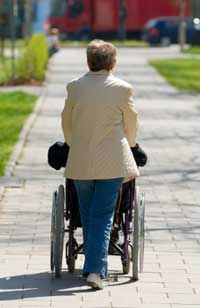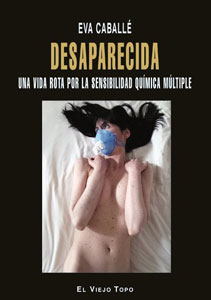An Account from the Editor of the CSN-Blog
 Several years have passed. We still had local self-help groups and met monthly. We kept contact by phone, because barely none of our members had internet. Most of them became ill by chemicals at the workplace. Though it is ten years ago, we still remember certain people or episodes. Last week when a woman with Chemical Sensitivity (MCS) and severe toxic injuries sent an article for the blog, in which she reported on the struggle with the German Federal Insurance Institution for Employees because of a scheduled Rehab, we returned to a case.
Several years have passed. We still had local self-help groups and met monthly. We kept contact by phone, because barely none of our members had internet. Most of them became ill by chemicals at the workplace. Though it is ten years ago, we still remember certain people or episodes. Last week when a woman with Chemical Sensitivity (MCS) and severe toxic injuries sent an article for the blog, in which she reported on the struggle with the German Federal Insurance Institution for Employees because of a scheduled Rehab, we returned to a case.
Marked by chemicals
We had a meeting of our local “Workgroup of Chemically Injured”. The guy was rather young but looked quite older. He entered the room escorted by his sister. She had to support him, because the young man lost his sense of balance. After the speeches we chatted. The Sister said her brother was already exhausted as he tried to listen and he is nearly unable to speak. Once he worked at a big car tire manufactory. Now he is a health wreck. In spite of his harrowing state of health, the social pension fund created stress and refused to pay. The Workers Compensation didn’t act any more cooperatively: they denied realizing a connection between the desperate state of health and the chemical exposure at work. Though he was on the ropes, the young man was not willing to accept the experience of injustice by these insurance companies in addition to his physical suffering.
Brain damage by solvents
His sister told that he has gone through brain surgery. They hoped to manage his vertigo and his brain symptoms with a demanding operation. There was no improvement – rather the opposite. Most of the day he stayed in his room and watched videos. Contact with his friends was nearly broken for two reasons. The young man was no longer capable of conversation and he was unable to drive his car to his friends, who lived in neighboring locations. Friends who still came to visit him in the beginning were completely shocked by the bad health of their peer and could hardly deal with the sight. This few visits were the result, and then nobody came again.
Injured by chemicals at workspace
But for all of that the family of the man endeavored to enhance his state. The sister said that his condition isn’t always the same, so she hopes that there will be some turn for the better. She asked what the family may do to achieve a bit of health stabilization. At that time, my first advice to her was to arrange the man’s room to be absolutely free from chemicals and to abandon plastic materials completely, because he had become ill from synthetics, solvents and rubber.
The sister listened to my detailed explanations, how a clean room for a chemically sensitive person should look like. After that she rated the room totally inappropriate, in which the former quite vital young man spent nearly all of his time. There he had a TV, a video recorder, many video tapes, carpeting, a normal foam mattress in the bed and vinyl wallpaper. A room like the ones of many millions other young folks.
Aid by the family
The family was serious about it. They wanted to see the young man healthier again. They dedicated all their efforts. Two rooms at ground level were arranged for him. They tiled the floor and finished the walls with safe natural paint. They obtained a good air purifier, a mattress from natural material and made everything compatible.
Scarcely two months later the sister called me by phone. As she started to speak, the depression in her voice had completely disappeared. It is unlikely to believe, but her brother feels better worlds apart. At Saturday he even was able to visit his friends in the neighbor town riding his car without any help. She said, the whole family is overjoyed, because they didn’t consider such a recovery possible any more. The young man only became dizzy, when he was exposed to certain chemicals. He learned to detect such situations and avoided exposure. He left instantly when he realized them. Step by step his former vitality returned. The sister called more often and proudly reported on his further progresses.
Rehab in face of the delicate state of health
Then there was another call. Completely upset, the sister told that her brother received a letter from the social pension fund. He’s scheduled for a rehab. They rang up to tell the official from the German Federal Insurance Institution for Employees about the state of the young man and that he needs a chemical free environment and organic food. There was no understanding: he was liable to cooperate or otherwise his entitlement under pension scheme will be lost. The result of a call to the specified rehab clinic was that nothing there met the requirements for the young man’s health. Nevertheless he had to go into the regimen, they wanted to estimate his working ability and stabilize him, as they said.
Bring a wheelchair
At the next call, the voice of the sister was nearly dead. She told that her brother really had been in those rehab. She picked him up yesterday. He was there for nearly four weeks. When she phoned in, she was not permitted to speak with her brother. This was not beneficial for the therapy, they said. The day before yesterday they called her in the morning. She was told she could pick up her brother and may please bring a wheelchair.
Anger and pain
The sister reported that she broke out in tears as she came for her brother. No trace was left of the previous improvements in his health. His state was worse than before all the measures which had been taken by the family with great efforts and financial costs.
She had to carry her brother into the car helped by a male-nurse. She asked the nurse what had been done with her brother in the rehab. He shook his shoulders and turned his view to the floor. At this moment she had boiled with rage and went into the building then and closely looked at it. Heavy chemical smell from carpeting engulfed her. It’s just newly installed, so it still smells, the nurse told her. She asked to be shown to the room. Carpeting, smell of disinfectants, particle board furniture etc.
The refectory, in which her brother was urged to take his meals, was more than 100 meters away. To reach it he has to pass a long hallway without windows for ventilation, floored with carpeting which badly smelled from chemicals and adhesives. He repeatedly begged to be allowed to have his meals in the room, which was not allowed. Other patients even had offered to bring him the meals to save the staff from extra work. The directive was not changed; the young man had to resort to the refectory for the meals, where he additionally was exposed to perfumes, after shave and other scents. As he became unable to make it through the long hallway afoot, he got a walking frame, shortly later they gave him a wheelchair.
The indoor pool of the rehab was near the brother’s room. The odor of chlorine flooded the whole area. In spite of his heavy reactions to chlorine he had to take part in the exercise therapy in the swimming pool for several times. He was exempted from participation when he nearly “drowned” in the pool, because of a reaction.
In a strained voice the sister said after her report: “They have not made my brother healthy, they have executed him and now I know why I never was allowed to have a word with him. Any health success he had before the rehab therapy is destroyed.”
Health decline by rehab
This is no isolated case even if it is in his consequences one of the most worst cases ever reported to me. There are no rehab facilities adapted to the needs of chemically sensitive patients in Germany.
If patients with Chemical Sensitivity scheduled for a rehab ask about the local environmental conditions and explain that they cannot stay in such premises because of their reactions to chemicals, they were blamed for a lack of cooperation.
Some chemically sensitive persons had to accept a substantial decline of their health, because they were scheduled to rehab clinics which offered neither organic food nor chemical free environmental conditions, and where the smell of scent agents and disinfectants flooded the whole building.
Many chemically sensitive retirement pensioner aspirant tried to hold out – or managed somehow to hold out, to avoid being alleged for having not “cooperated”. These chemically sensitive patients feared to forfeit their pension claim. An enhancement wasn’t ever reported in a single case. On the contrary: what the chemically injured persons had regained by many restrictions and a environmental controlled living space was lost.
Finally? Hopefully
But it seems the German Federal Insurance Institution for Employees sees reason to show some understanding. A single mother struggled until the Insurance understood. Finally, the rehab measure for which they put her under heavy pressure was withdrawn, accepting her MCS and due to the lack of a suitable clinical facility for chemically sensitive patients.
Author: Silvia K. Mueller, CSN – Chemical Sensitivity Network, April 6, 2010
Translation: Thank you very much to BrunO!
Proof-reading: Thank you very much to John!
Related articles:





 The veterinarian Coretta Danzer is sensitive to chemicals. She reacts to common household chemicals with various physical symptoms. In medicine this illness is called MCS – Multiple Chemical Sensitivity. It occurs specifically in industrialized countries and according to studies it affects about 15 to 30 percent of the general population in different degrees of severity. In spite of that, the disease is little discussed in public. This was the decisive reason that Coretta Danzer agreed to talk in common with the environmental medicine expert Klaus Runow, M.D. in the popular
The veterinarian Coretta Danzer is sensitive to chemicals. She reacts to common household chemicals with various physical symptoms. In medicine this illness is called MCS – Multiple Chemical Sensitivity. It occurs specifically in industrialized countries and according to studies it affects about 15 to 30 percent of the general population in different degrees of severity. In spite of that, the disease is little discussed in public. This was the decisive reason that Coretta Danzer agreed to talk in common with the environmental medicine expert Klaus Runow, M.D. in the popular